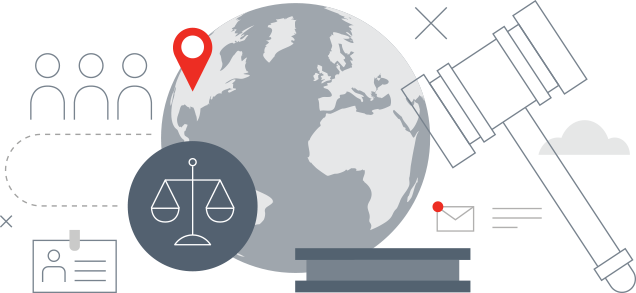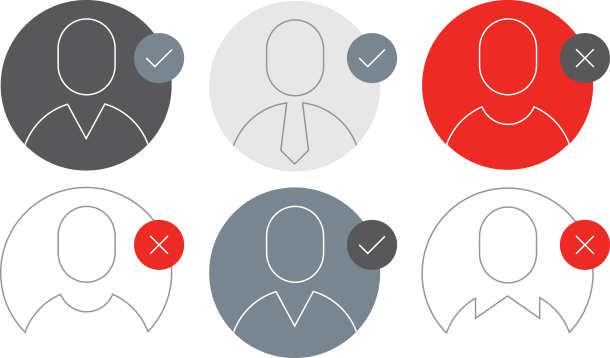When doing business, it's important to know you’re building relationships with the right people and avoiding anyone who can harm your business. This isn’t just about avoiding people who don’t email back in a timely fashion; it’s about avoiding anyone who, by law, you shouldn’t be working with.
Financial sanctions were created to prevent financial crime across the globe. All over the world, governments restrict and prohibit conducting business with anyone on a sanctions list, so it’s important that you have a full understanding of what is on these sanction lists and if it affects your industry.
This guide is to help answer some of the most common questions associated with sanctions and help you protect your business with the right screening.
What is a sanctions list?
Financial authorities and governments use sanction lists globally to prevent businesses from working with anyone involved in various criminal financing or terrorist activities.
When considering sanctions, it’s not just individuals you need to be wary of, its whole industries and countries that appear on sanctions lists. Individuals and entities on this list are subject to financial restrictions to prohibit counter-terrorism regimes and money laundering all around the world.
How do you end up on a sanctions list?

To put it simply, you end up on a sanctions list if you have been involved in illegal activity that a government or international authority deems severe enough to warrant restriction or prohibition.
There are different sanctions for different things, which may mean your industry can work with some industries, people and countries that others cannot and vice versa.
For individuals, sanctions may mean that they can no longer leave the country or use their bank accounts to move money. For certain countries, they may have an arms embargo or have no right to trade in other countries. It’s a big range so you have to check each case by case.
Criminal activity that may be cause for sanctioning includes (but is not limited to) the following:
- Terrorist activity and financing terrorists
- The creation of weapons and arms (or financing of)
- Human rights violations
- Money Laundering
Who uses sanction lists?
As explained, we use sanction lists globally – after all, who wants to be in business with anyone funding crime and terrorist activities? This is not only a moral decision but one enforced by law. So it’s likely no matter who you are, you are subject to sanction lists around the world.
For example, some of the sanction lists include:
- UK sanction list – The UK government provides the United Kingdom’s Consolidated sanction list.
- EU sanction list – The European Union’s Consolidated Sanction list.
- OFAC sanctions list – Treasury Department’s Office of Foreign Asset Control enforces many of the United States of America’s sanction lists.
These lists affect most people and businesses globally. For instance, the UK is not only subject to our list but also the EU’s list. Furthermore, we follow Worldwide restrictions and avoid anyone associated with terrorist activities, the same as in most other countries.
What happens if I breach a sanctions list?
If a company has been sanctioned they have been issued a penalty by law for failure to comply with a court order, law or regulation.
These laws vary between companies, individuals and countries, but it is illegal to break the sanction laws that affect your country and industry you work within. Therefore, it is important to run a check on them and become compliant with the current guidelines set in place. If your company deals with a sanctioned company, even if you are a limited company you can be personally prosecuted for this and could risk going to prison.
To learn more about what penalties come with breaking sanction laws, you can learn more about them from the government website.
How can I check who is on a sanctions list?
As you can see from the links above, sanction lists are usually made available online. This is so everyone can have access to them and no one has a true excuse to not have this information available to them when creating business relationships.

However, manually searching through these lists and the masses of data they hold on each prohibited individual or country is no easy task. This is further complicated when you consider that as a business, you are also expected to monitor these relationships in case they end up on a sanctions list. Taking on the challenge of checking every person, company, country, and region you work with every time you do business would take a huge amount of human resources.
That’s why most businesses would choose to use a tool that gathers this data and allows them to instantly check online to keep up to date with sanction screening. Creditsafe compliance products and sanction checks do exactly this. They can instantly deliver you an answer and alert you to any changes that happen to any companies you monitor.
You can be confident that you are complying with sanction and KYC laws and protect your business from some of the penalties when you get into business with the wrong people.
Sanction screenings not only help protect your business and reputation but help prevent the further spread of financial crime.
Learn how to run PEPs and Sanctions checks by clicking here.
What are the sanctioned countries?
As we’ve mentioned, it’s not just individuals and businesses that you have to avoid doing business with. You can also be prohibited from whole countries and regions. This varies between different countries (there are some variations between EU and US sanction lists, for example) but some of the sanctioned countries include:
- Afghanistan
- Balkans
- Belarus
- Bosnia & Herzegovina
- Burma
- Central African Republic
- Democratic Republic of Congo
The restrictions in these countries can be anything from embargos on weapons and arms, bans from funding from other countries to extensive trade laws. Each sanctioned country on these lists has different rules and regulations that you will need to be aware of before doing any business.
To stay updated, it would be more efficient to use Creditsafe’s PEP and Sanction checks or check the updated lists found on the Government websites.
To see the updated list of sanctioned countries, visit the Treasury website.
How do I report a sanctions list breach?
Of course, you can be as vigilant as possible but crime still happens and you may have reason to believe these sanctions are being breached.
Using a good sanction list screening service should help to rule out false positives – checks often compare geographical data for example, so a similar name shouldn’t cause issues. Once you determine someone is breaching these laws, regulatory compliance means you have to report this crime to the appropriate authorities.
To see what a business in the United Kingdom should do you can read the Government advice. Or go directly to your governing body to seek further advice.